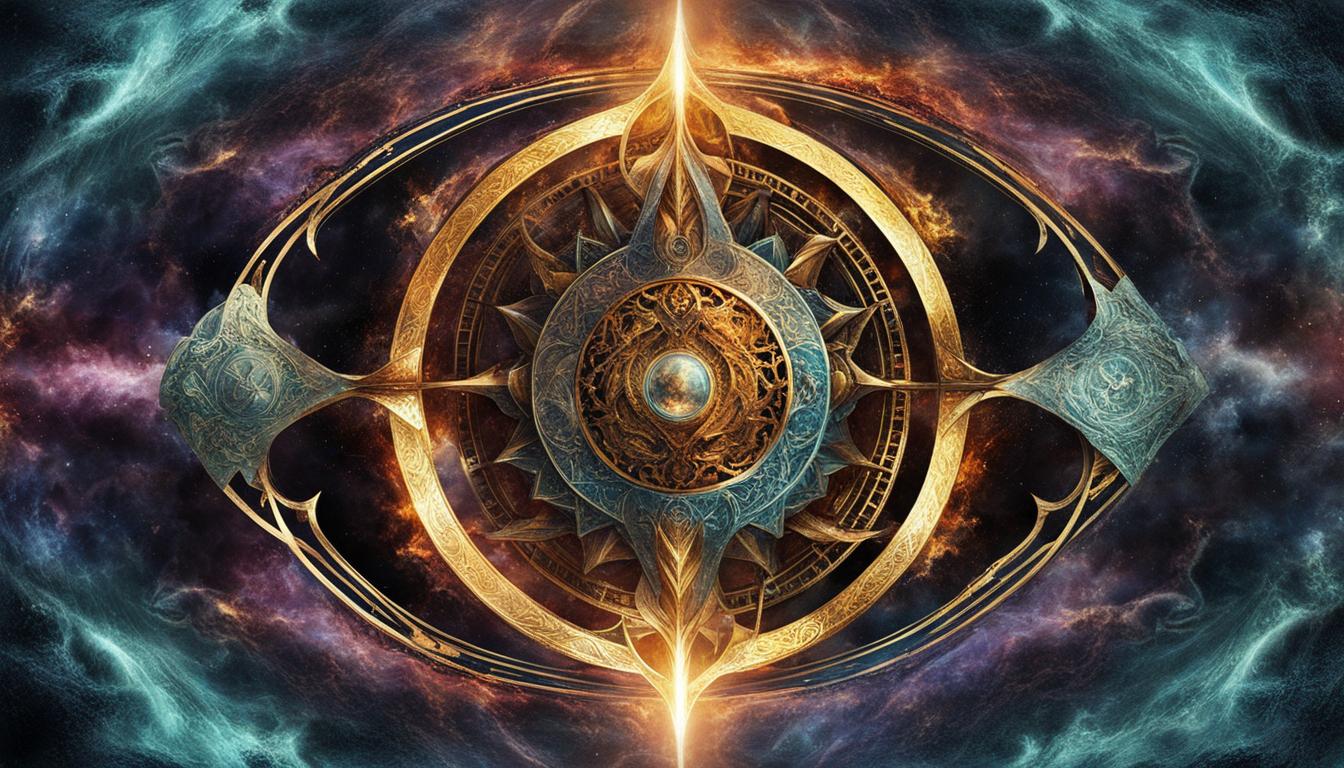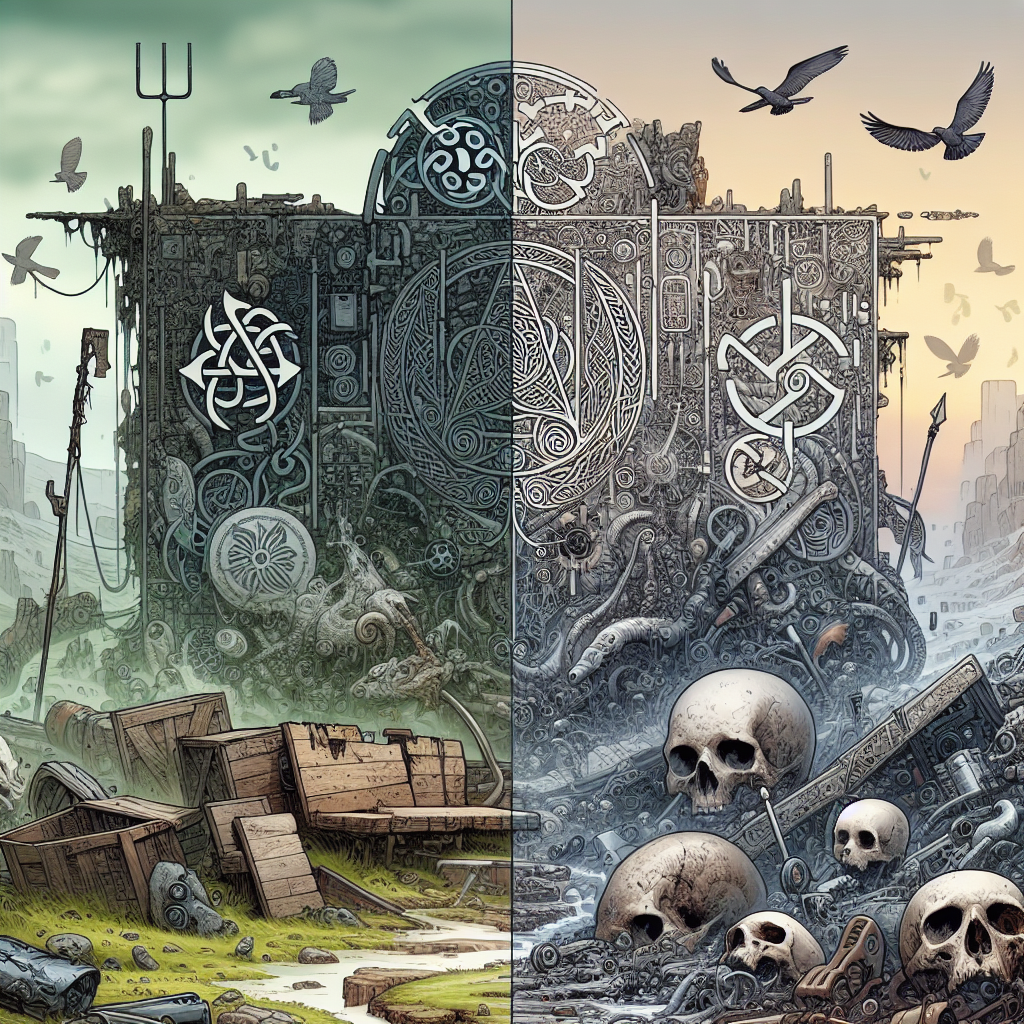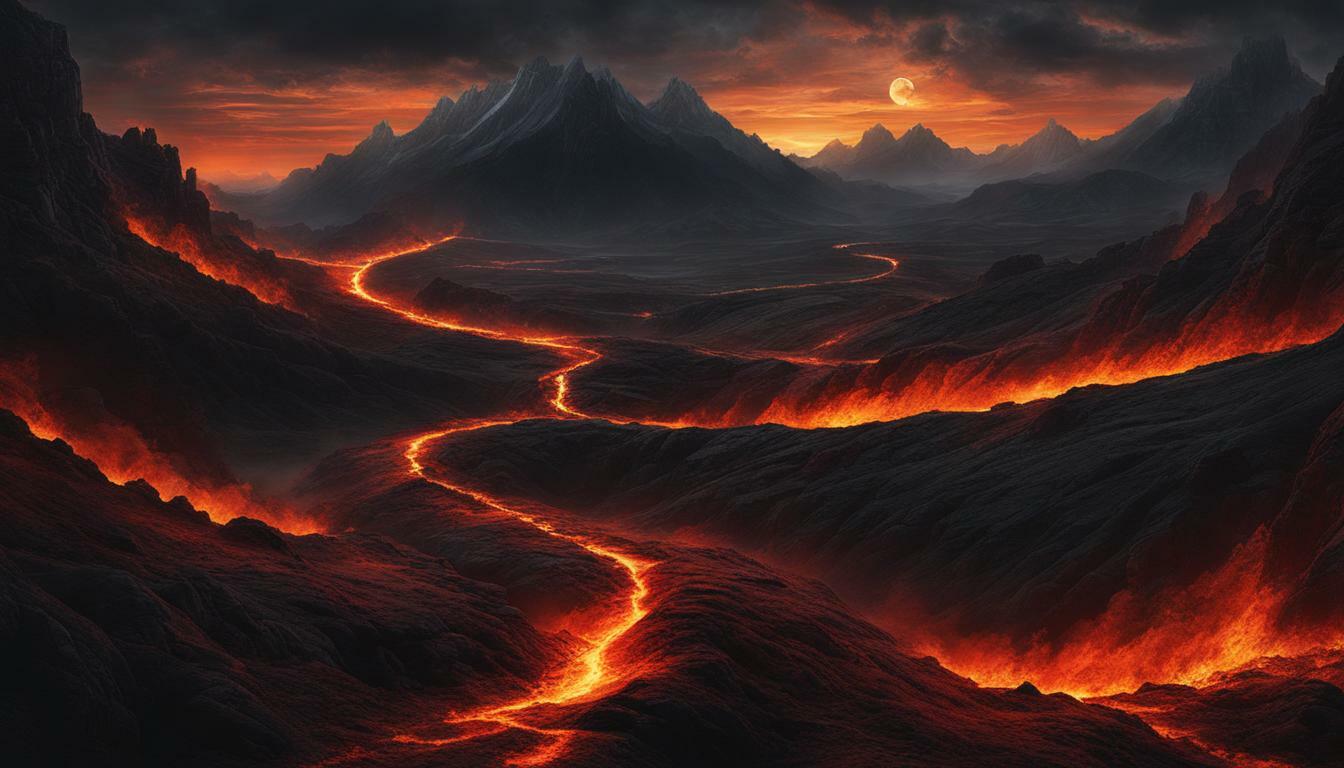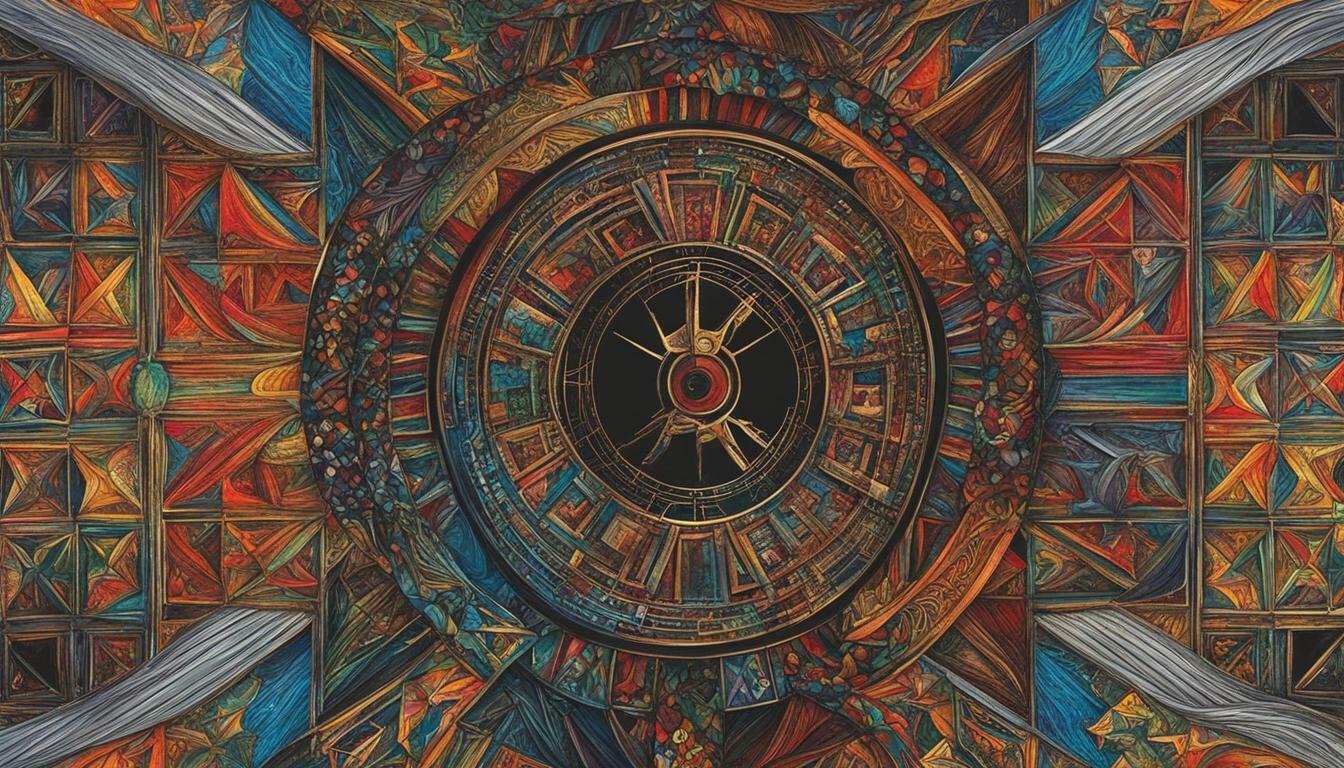Welcome to our article exploring the fascinating differences between the afterlife views in Asgard and Olympus. In Greek mythology, the gods are led by Zeus, while in Norse mythology, they are led by Odin. These differing leadership roles shape the beliefs and representations of the afterlife in both mythologies.
Key Takeaways:
- Greek and Norse mythologies differ in their leadership structures, with Zeus leading the Greek gods and Odin leading the Norse gods.
- The dwellings of the gods also vary, with Mount Olympus being the home of the Greek gods and Asgard serving as the residence of the Norse gods.
- In Greek mythology, the underworld is Hades, while in Norse mythology, Niflheim and Helheim are the realms of the dead.
- Both mythologies have unique afterlife beliefs and concepts, such as the Elysian Fields and Tartarus in Greek mythology, and Valhalla and Helheim in Norse mythology.
- Greek gods are immortal, while Norse gods are kept young and immortal by Idun’s golden apples.
Leadership in Greek and Norse Mythology
In Greek mythology, Zeus is the leader of the gods, known as the king of the Olympians. He holds supreme power and authority, reigning over Mount Olympus. Zeus is associated with the sky and thunder, representing his domain over the natural forces of the world. His role as a leader is defined by his ability to maintain order and make decisions that impact both gods and mortals.
In Norse mythology, the leader of the gods is Odin, also known as the All-Father. Odin is known for his wisdom, knowledge, and ability to foresee the future. He rules over Asgard, the realm of the gods, and holds court in his great hall, Valhalla. Unlike Zeus, Odin’s leadership is closely tied to his role as the god of battle and poetry. He guides warriors in their quests for glory and honor, and he is also the patron of poets and skalds.
While both Zeus and Odin hold positions of leadership in their respective mythologies, their powers and domains differ. Zeus is the god of the sky and thunder, representing his authority over the natural elements. Odin, on the other hand, is the god of battle and poetry, embodying the values of strength and wisdom in Norse culture.
Comparison of Leadership in Greek and Norse Mythology:
| Greek Mythology | Norse Mythology |
|---|---|
| Zeus is the leader of the Olympians | Odin is the All-Father and leader of the gods |
| Zeus is associated with the sky and thunder | Odin is the god of battle and poetry |
| Zeus maintains order and makes decisions | Odin guides warriors and inspires poets |
Dwellings of the Gods
In Norse and Greek mythologies, the gods have their unique dwellings that reflect their power and influence. In Greek mythology, Mount Olympus is the sacred abode of the Greek gods. Situated high above the earth, its majestic peaks are shrouded in myth and mystery. The gods convene in its grand halls to discuss matters of importance and make decisions that shape the mortal world. Olympus is a realm of splendor and divine beauty, where the gods bask in eternal glory.
On the other hand, the Norse gods find their home in Asgard, a realm that is no less magnificent than Mount Olympus. Asgard is a celestial city, revered and revered by gods and mortals alike. It is here that Odin, the ruler of the gods, holds court and governs the affairs of the Nine Realms. Asgard is a place of great power, where the gods prepare for the final battle, Ragnarok, and uphold their sacred duty to protect the cosmos.
Valhalla – Hall of the Slain
One notable feature of Asgard is Valhalla, the grand hall of the slain warriors. According to Norse mythology, brave warriors who die on the battlefield are chosen by Valkyries and taken to Valhalla, where they await the ultimate battle of Ragnarok. Valhalla is a place of honor and glory, where warriors can feast, fight, and prepare for their final destiny. It is a testament to the warrior culture that permeates Norse mythology and exemplifies the valor and bravery of those who are chosen to dwell within its hallowed halls.
While the dwellings of the gods in Norse and Greek mythologies differ in their architectural grandeur and purpose, both Mount Olympus and Asgard represent the divine realm where gods exercise their power, make decisions, and prepare for the future. These dwellings serve as symbols of the gods’ authority and the central hub of their respective mythologies.
| Greek Mythology: Mount Olympus | Norse Mythology: Asgard |
|---|---|
| The dwelling place of the Greek gods | The celestial city of the Norse gods |
| Convenes the gods for important discussions | Ruled by Odin, the king of the gods |
| A realm of splendor and divine beauty | The dwelling place of Valhalla, the hall of the slain |
| Situated high above the earth | Prepares for the final battle, Ragnarok |
Both Mount Olympus and Asgard hold a significant place in their respective mythologies, representing the concepts of power, divinity, and the ultimate dwelling place of the gods. These mythological dwellings provide a glimpse into the rich and varied worlds of Norse and Greek mythology, where gods and mortals collide, and destinies are forged.
Norse Mythology Afterlife vs Greek Mythology Afterlife
In Norse mythology, the realm of the mortals is known as Midgard, which exists below the divine realm of Asgard. Midgard is where humans reside and where their lives unfold. On the other hand, in Greek mythology, mortals dwell on Earth, with Mount Olympus positioned within their realm. While both mythologies have separate realms for mortals, their locations and connections to the divine differ.
In addition to Midgard and Earth, Norse and Greek mythologies also feature other realms. Norse mythology includes Alfheim, the land of the Light Elves, and Vanaheim, the realm of the Vanir fertility gods. Greek mythology primarily focuses on Earth, Mount Olympus, and the underworld realm of Hades, where the dead reside. These various realms highlight the diverse cosmologies and perspectives of Norse and Greek mythologies.
To further illustrate the contrasting afterlife beliefs, the following table provides a summary of the realms and their significance in Norse and Greek mythologies:
| Norse Mythology Afterlife | Greek Mythology Afterlife |
|---|---|
| Valhalla: Hall of the slain warriors | Elysian Fields: Paradise for the virtuous |
| Folkvang: Afterlife for everyday warriors | Tartarus: Abyss for punishment |
| Helheim: Realm for non-glorious deaths | Asphodel Meadows: Where neutral souls reside |
As demonstrated by the table, Norse mythology offers a more diverse afterlife experience with multiple realms catering to warriors, everyday mortals, and the non-glorious dead. In contrast, Greek mythology presents a more linear afterlife progression, with distinct destinations based on one’s character and actions in life.
Difference Between Asgard and Olympus Afterlife Views
In Greek mythology, the afterlife is represented by the underworld known as Hades. Here, all the souls of the dead reside, regardless of their deeds in life. The Greek concept of the afterlife includes two main destinations: the Elysian Fields and Tartarus.
The Elysian Fields, also referred to as Elysium, is a paradise reserved for those who lived virtuous lives. It is a realm of eternal bliss and happiness. On the other hand, Tartarus serves as a place of punishment for the wicked and is often associated with suffering and torment. It is in Tartarus that the Titans and other mythical creatures are imprisoned.
In Comparison:
| Asgard (Norse Mythology) | Olympus (Greek Mythology) |
|---|---|
| Asgard has multiple realms for different types of deaths such as Valhalla for brave warriors, Helheim for non-glorious deaths, and Folkvang for everyday warriors. | The Greek afterlife has a single realm, Hades, where all the dead reside, but with different destinations depending on the nature of one’s life – Elysian Fields for the virtuous and Tartarus for the wicked. |
| Asgard does not have a specific realm for punishment. | Tartarus serves as a place of punishment for the wicked in Greek mythology. |
| Asgard’s afterlife views are more diverse and encompass various possibilities. | The Greek afterlife views are more structured and limited in terms of destinations. |
These differences illustrate the contrasting beliefs about the afterlife in Norse and Greek mythologies. While Greek mythology has a more unified and structured concept of the afterlife, Norse mythology offers a broader spectrum of destinations, each catering to different types of deaths. Both mythologies provide intriguing insights into the human fascination with the afterlife and the different interpretations of what happens to us beyond death.
Afterlife Beliefs in Greek Mythology
In Greek mythology, the afterlife is a realm known as Hades. It is believed that the fate of the dead is determined here, where they are judged based on their actions in life. According to Greek mythology, the good may go to the Elysian Fields, a paradise reserved for those who have lived virtuous lives. The Elysian Fields are described as a place of eternal bliss and happiness, where the souls of the righteous can enjoy peace and tranquility for all eternity. On the other hand, the bad may be sent to Tartarus, a deep abyss where the wicked are punished for their sins. Tartarus is a place of suffering and torment, reserved for those who have committed evil acts in their lives.
It is important to note that Greek mythology does not have a single afterlife destination for all souls. Instead, the afterlife is depicted as a complex realm with various regions and domains for different types of souls. Each soul is judged individually and assigned a specific destination based on their moral character.
Overall, Greek mythology offers a nuanced and multi-faceted view of the afterlife. It acknowledges the existence of different realms and provides a mechanism for judging and assigning the souls of the dead to different destinations based on their actions in life.
Table: Afterlife Beliefs in Greek Mythology
| Realm | Description |
|---|---|
| Elysian Fields | A paradise for the souls of the righteous, offering eternal bliss and happiness. |
| Tartarus | A deep abyss where the wicked are punished for their sins, a place of suffering and torment. |
The table above summarizes the main afterlife destinations in Greek mythology. It is important to note that these destinations are not exhaustive, as Greek mythology offers a rich and complex understanding of the afterlife. The Elysian Fields and Tartarus represent two contrasting realms where souls may be sent based on their moral character.
Asgard and Olympus: Contrasting Views of Immortality
In the realms of Norse and Greek mythology, the concept of immortality takes on different forms. While the gods of Mount Olympus in Greek mythology are inherently immortal, the gods of Asgard in Norse mythology rely on external sources to maintain their everlasting existence.
According to Greek mythology, the immortal gods do not age or require sustenance. They possess eternal youth and are not bound by the limitations of mortal existence. In contrast, the gods of Asgard depend on Idun and her golden apples to preserve their youth and immortality. These apples, grown in Asgard, provide the gods with the vitality they need to remain ageless.
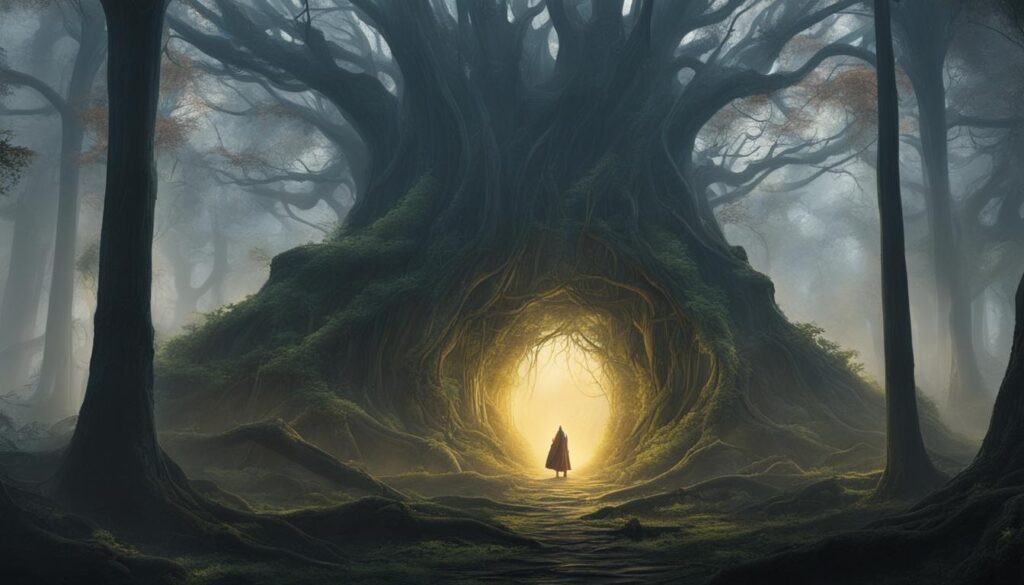
In both mythologies, the gods possess extraordinary powers and abilities. However, the gods of Olympus are described as requiring little sustenance, while the gods of Asgard still require the basics for survival, such as food and water. This fundamental difference underscores the distinct perspectives on immortality in Greek and Norse mythologies.
Olympus and Asgard: A Comparison
| Aspect | Olympus (Greek Mythology) | Asgard (Norse Mythology) |
|---|---|---|
| Source of Immortality | Inherent immortality | Idun’s golden apples |
| Dependency | Require little sustenance | Depend on food and water |
The contrasting views of immortality in Asgard and Olympus highlight the unique beliefs and perspectives of each mythology. While the gods of Olympus are eternally ageless and self-sufficient, the gods of Asgard rely on external sources to maintain their vitality and immortality.
Asgard and Olympus Afterlife Beliefs
In Norse mythology, Asgard is the home of the Aesir gods, while in Greek mythology, Olympus is the dwelling place of the Greek gods. These mythologies have distinct views on the afterlife, which are shaped by their respective beliefs and concepts.
Both Asgard and Olympus acknowledge the existence of an afterlife, but the specific details differ. In Asgard, fallen warriors are welcomed into Valhalla, a great hall where they await Ragnarok, the final battle. Meanwhile, in Olympus, the souls of the dead reside in the realm of Hades, with judgment and rewards based on their deeds in life.
To better understand the differences, let’s examine the afterlife beliefs of Asgard and Olympus in more detail:
Asgard’s Afterlife Beliefs
- Valhalla: The most prestigious realm in Asgard, where brave warriors reside and prepare for Ragnarok.
- Folkvang: A realm in Asgard where everyday warriors find their eternal resting place.
- Ran’s Hall: The location within Asgard for those who meet their demise through drowning.
- Helheim: The realm of non-glorious deaths, where souls find their eternal rest under the watch of Hel, the daughter of Loki.
Olympus’ Afterlife Beliefs
- Hades: The realm where the souls of the deceased go, where they face judgment and receive their rewards or punishments.
- Elysian Fields: A paradise reserved for the good and righteous.
- Tartarus: A place of punishment for the wicked and evil-doers.
As we can see, the afterlife beliefs of Asgard and Olympus differ in terms of the realms and destinations for the souls of the dead. While Asgard has multiple realms catering to different types of deaths, Olympus focuses on a single realm with varying destinations based on one’s actions in life.
This contrast in afterlife views showcases the unique beliefs and values of Norse and Greek mythologies, providing insight into the diverse mythological traditions that have fascinated and captivated people for centuries.
Asgard – Home of the Norse Gods
In Norse mythology, Asgard is the majestic realm that serves as the home of the Aesir gods. This celestial city, located high above the human world of Midgard, is a place of grandeur and power. Asgard is ruled by the wise and mighty Odin, the Allfather, who holds court in his great hall, Valhalla.
Valhalla, one of the most iconic locations in Norse mythology, is a hall reserved for the brave warriors who perish in battle. Here, fallen heroes are feasted and celebrated, as they await the final battle of Ragnarok. The Bifrost, a brilliant rainbow bridge, connects Asgard to the human world of Midgard, allowing gods and mortals to travel between the realms.
Asgard is not the only realm in Norse mythology. It is part of a complex cosmology that includes eight other realms. These realms range from Alfheim, the realm of the Light Elves, to Helheim, the realm of the dead. Each realm has its own unique characteristics and inhabitants, adding depth and richness to the Norse mythological universe.
Asgard: The Realm of the Norse Gods
Asgard is a central and significant realm in Norse mythology. It is the realm of the Aesir gods, where they reside and hold court. Asgard is a place of power, beauty, and grandeur, with magnificent halls such as Valhalla, where fallen warriors are honored and prepared for the final battle of Ragnarok. However, Asgard is just one of the nine realms in Norse mythology, each with its own unique characteristics and inhabitants.
Realms of Norse Mythology
Let’s explore the various realms that exist alongside Asgard:
| Realm | Description |
|---|---|
| Vanaheim | The realm of the Vanir fertility gods. |
| Jotunheim | The land of the Jotnar, the giants of Norse mythology. |
| Midgard | The realm of mortals, also known as Earth. |
| Niflheim | The icy realm of the dead, ruled by the goddess Hel. |
| Alfheim | The home of the Light Elves, known for their beauty and grace. |
| Nidavellir | The realm of the Dwarves, expert craftsmen and smiths. |
| Muspelheim | The fiery realm of the fire giants and the primordial fire. |
| Helheim | The realm of the dishonorable dead and those who die of old age or sickness. |
These realms, along with Asgard, create a rich and expansive mythology that explores a diverse range of landscapes and beings. Each realm has its own distinct qualities and plays a specific role in the Norse cosmology. It is through the interconnectedness of these realms that the stories and adventures of the Norse gods unfold.
The Destruction of Asgard
In Norse mythology, Asgard is the majestic home of the Aesir gods, ruled by the mighty Odin. However, despite its grandeur and power, Asgard has faced destruction not once, but twice. The first time was during a war between the Aesir and the Vanir, two warring factions of gods. This cataclysmic event led to the ruin of Asgard, shattering its splendor and forcing the gods to rebuild their sacred realm.
But the threat of annihilation looms over Asgard once more, foretold by the prophecy of Ragnarok. This apocalyptic battle will mark the end of the world and bring about the destruction of Asgard. The forces of chaos and darkness, led by the fearsome Loki and his monstrous offspring, will wage war against the gods. The result will be a fierce and devastating conflict that will leave Asgard in ruins and claim the lives of many great warriors.
Despite these dire circumstances, the destruction of Asgard serves a greater purpose in Norse mythology. It represents the cyclical nature of existence, where creation and destruction are intertwined. From the ashes of Asgard’s downfall, new possibilities and a fresh beginning can emerge. It is a reminder that even the most powerful and immortal beings are subject to the ebb and flow of fate, and that nothing lasts forever.
Conclusion
In conclusion, the difference between Asgard and Olympus afterlife views is significant and reflects the unique cultural perspectives of Norse and Greek mythology.
In Greek mythology, the afterlife is centralized in Hades, where all the dead reside. The fate of individuals is determined based on their actions in life, with the possibility of going to the Elysian Fields for the virtuous or Tartarus for the wicked. Greek mythology emphasizes a single realm for the dead and their ultimate judgment.
In contrast, Norse mythology offers a more diverse and multifaceted afterlife. Various realms exist, each catering to different circumstances and types of deaths. Valhalla, the most prestigious location, is reserved for brave warriors who fall glorious in battle. Folkvang welcomes everyday warriors, and Helheim is designated for those with less glorious demises. This intricate system highlights the Norse belief in valuing different aspects of life and death.
While both mythologies have their own unique beliefs and concepts surrounding the afterlife, Greek mythology focuses on a centralized judgment, while Norse mythology encompasses a broader range of afterlife locations. These differences reflect the cultural nuances and values inherent in each mythology, making them both fascinating and distinct in their interpretations of the afterlife.
FAQ
What is the difference between the afterlife views in Asgard and Olympus?
In Asgard, Norse mythology believes in multiple afterlife locations, while in Greek mythology, there is a single realm for the dead in Hades.
What are the leadership structures in Greek and Norse mythology?
In Greek mythology, Zeus leads the gods, while in Norse mythology, Odin is the leader.
Where do the gods dwell in Greek and Norse mythology?
In Greek mythology, the gods reside on Mount Olympus, while in Norse mythology, they reside in Asgard.
Where do mortals live in Greek and Norse mythology?
In Greek mythology, mortals live on Earth, while in Norse mythology, they live in Midgard.
How are the underworlds different in Greek and Norse mythology?
In Greek mythology, the underworld is Hades, while in Norse mythology, it is Niflheim and Helheim.
What are the afterlife beliefs in Greek mythology?
In Greek mythology, the fate of the dead is determined in Hades, with different destinations depending on the nature of one’s life.
How is immortality depicted in Greek and Norse mythology?
Greek gods are immortal, while Norse gods are kept young and immortal by Idun and her golden apples.
Is there a belief in fate and destiny in both Greek and Norse mythology?
Yes, both mythologies have strong beliefs in destiny and the inability to change fate.
What is Asgard and its significance in Norse mythology?
Asgard is the home of the Norse gods, where Odin holds court, and Valhalla, the great hall of the slain, is located.
What are the different realms in Norse mythology?
The realms in Norse mythology include Asgard, Vanaheim, Jotunheim, Midgard, Niflheim, Alfheim, Nidavellir, Muspelheim, and Helheim.
Has Asgard been destroyed in Norse mythology?
Yes, Asgard was destroyed in a war between the Aesir and Vanir but was later rebuilt. It is prophesied that it will be destroyed again during Ragnarok, the end of the world.
